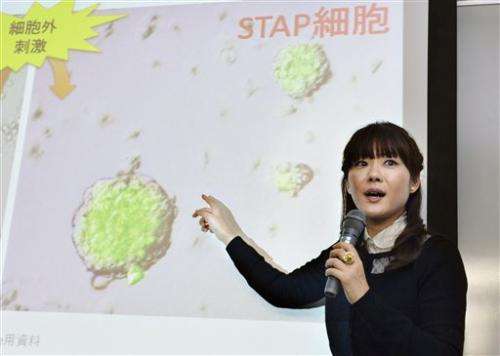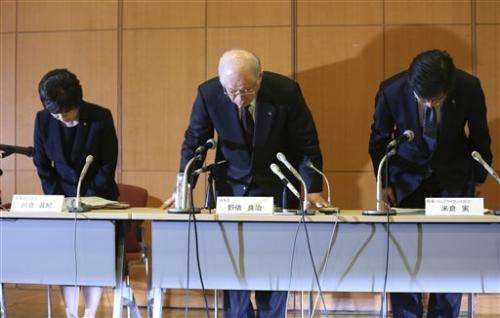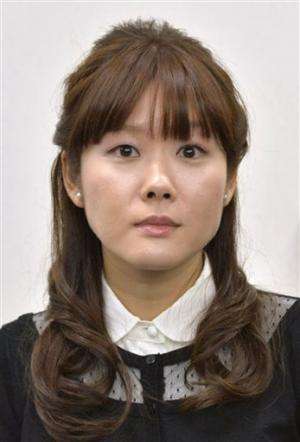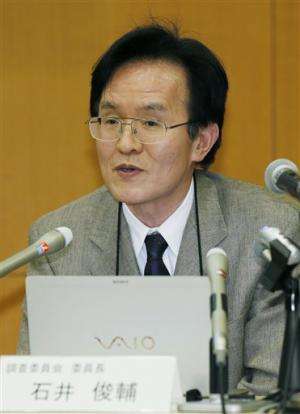
In this Jan. 28, 2014 photo, Japanese government-funded laboratory Riken Center for Development Biology researcher Haruko Obokata, the lead author of a widely heralded stem-cell research paper, speaks about her research results on stimulus-triggered acquisition of pluripotency (STAP) cells during a press conference in Kobe, western Japan. Scientists at the institute said Tuesday, April 1, that discrepancies in research published in January in scientific journal Nature stemmed from image manipulation and data fabrication. They said Obokata had manipulated or falsified images of DNA fragments used in the research. (AP Photo/Kyodo News)
The finding that a lead researcher falsified data in a widely heralded stem-cell research paper is a setback for Japan's efforts to promote its advanced research, but also a symptom of the pressure for breakthroughs in the field, experts say.
Obokata disputed the allegations, saying in a statement issued by Riken that she plans to appeal the findings issued by a committee set up to investigate discrepancies in the research published in January in the scientific journal Nature.
Nature has refused comment on whether the article might be retracted but said it is conducting its own evaluation and considering Riken's findings.
While Obokata alone was blamed for manipulating images of DNA fragments used in the research, Riken's director Ryoji Noyori held her co-authors "gravely responsible" for negligence in failing to fully verify their findings.
"The Riken incident says much more about the pressures to publish, and the harsh competition in stem cell research, than it does about Japan, I think," Ivan Oransky, global editorial director of MedPage Today, a news service for doctors, said in an email.
Prime Minister Shinzo Abe has made greater gender equality and female advancement in the workforce a plank of his economic revival strategy for Japan. But the recognition of Obokata, a fashionable young woman, as a leading scientist still made waves in conservative, male-dominated Japan.
The developments at Riken are a setback for government efforts to market Japan's research and development expertise as a 21st century industry needed to revitalize the country's manufacturing.

Japan's research institute RIKEN President Ryoji Noyori, center, RIKEN Executive Directors, Maki Kawai, left, and Minoru Yonekura, bow during a press conference in Tokyo Tuesday, April 1, 2014. Scientists at the institute said Tuesday that discrepancies in research published in January in scientific journal Nature stemmed from image manipulation and data fabrication. They said researcher Haruko Obokata, the lead author of the paper in Nature, had manipulated or falsified images of DNA fragments used in the research. (AP Photo/Eugene Hoshiko)
Arthur Caplan, an expert on bioethics at New York University Langone Medical Center, said the doubts about the research are a "devastating blow" for Japanese science.
"The government has invested in cutting edge bioscience to promote Japan's economy, so the revelation of fraud and misconduct at a major institute is both an embarrassment for the government and a huge setback for the Japanese research community," he said.
Noyori, the Riken director, said that after allowing for an appeal, disciplinary action would be taken, including calling for retraction of the suspect paper.
Scientists hope to harness stem cells to replace defective tissue in a wide variety of diseases. Making stem cells from a patient would eliminate the risk of transplant rejection.
The researchers in Boston and Japan participating in the project used a simple procedure to turn ordinary cells from mice into stem cells by exposing cells from spleens of newborn mice to a more acidic environment than they are used to.
Cells from other tissue of newborn mice appeared to go through the same change if exposed to any of a variety of stressful situations, the researchers said.
Shunsuke Ishii, chairman of the investigating panel at Riken, told reporters Tuesday that Obokata had said she altered images used in the research to make the results "look more beautiful." Data she recorded also was fragmented and incomplete, he said. Obokata said some of the images were chosen by mistake.

This Jan. 28, 2014 photo shows Haruko Obokata, a researcher of Japanese government-funded laboratory Riken Center for Development Biology in Kobe, western Japan. Scientists at the institute said Tuesday, April 1, that discrepancies in research published in January in scientific journal Nature stemmed from image manipulation and data fabrication. They said Obokata, the lead author of a widely heralded stem-cell research paper, had manipulated or falsified images of DNA fragments used in the research. (AP Photo/Kyodo News)
The institute said it would take months more to determine whether the stem cell findings are valid regardless of any questions about the data. Obokata asserts the findings are genuine.
Noyori warned against any "personal attacks or violations of human rights of the authors," vowing to revamp the ethical standards, training and procedures at Riken, a prestigious institution founded in 1917 by Eiichi Shibusawa, a leading Japanese industrialist.
"Research misconduct occurred due to a young researcher's lack of experience and awareness of the importance of research ethics," Noyori said.
Obokata has not recently appeared in public and Juliette Savin, a spokeswoman for Riken, said that she could not comment on her status.

Shunsuke Ishii, the head of the committee set up to investigate allegations a widely heralded stem-cell research paper was fraudulent, speaks at a press conference on their findings in Tokyo Tuesday, April 1, 2014. Japanese government-funded laboratory Riken Center for Development Biology said Tuesday it found that data in the stem-cell research paper was falsified, holding the lead researcher responsible for the fabrication. They said researcher Haruko Obokata, the lead author of the paper in Nature, had manipulated or falsified images of DNA fragments used in the research. (AP Photo/Kyodo News)
The longer-term implications of the case will depend on how it is handled, said Oransky.
"Riken seems to have acted swiftly and mostly transparently, and that's a good thing," he said.
Journal information: Nature
© 2014 The Associated Press. All rights reserved.








Post comments